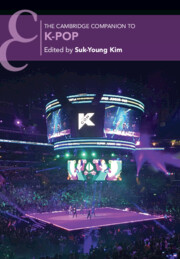Book contents
- The Cambridge Companion to K-Pop
- Cambridge Companions to Music
- The Cambridge Companion to K-Pop
- Copyright page
- Contents
- Figures
- Tables
- Contributors
- Acknowledgments
- Notes to Readers
- Introduction
- Part I Genealogies
- Part II Sounding Out K-Pop
- Part III Dancing to K-Pop
- Part IV The Making of Idols
- Part V The Band That Surprised the World
- 9 BTS, Transmedia, and Hip Hop
- 10 The BTS Phenomenon
- 11 Transcultural Fandom
- Part VI Circuits of K-Pop Flow
- Index
- References
9 - BTS, Transmedia, and Hip Hop
from Part V - The Band That Surprised the World
Published online by Cambridge University Press: 02 March 2023
- The Cambridge Companion to K-Pop
- Cambridge Companions to Music
- The Cambridge Companion to K-Pop
- Copyright page
- Contents
- Figures
- Tables
- Contributors
- Acknowledgments
- Notes to Readers
- Introduction
- Part I Genealogies
- Part II Sounding Out K-Pop
- Part III Dancing to K-Pop
- Part IV The Making of Idols
- Part V The Band That Surprised the World
- 9 BTS, Transmedia, and Hip Hop
- 10 The BTS Phenomenon
- 11 Transcultural Fandom
- Part VI Circuits of K-Pop Flow
- Index
- References
Summary
This chapter examines the emergence of hip hop in contemporary South Korea. Drawing on Henry Louis Gates Jr.’s concept of “signifying” and Achille Mbembe’s idea of “becoming black,” it looks at hip hop as a phenomenon where “Blackness” has gained a fungible agency that counters neoliberalism. The chapter explores the ways hip-hop performers in South Korea draw on their own experiences of social marginality in the ghetto-like world produced by unrelenting academic and economic competition to create their work. It also considers how the Korean language obliges rappers to experiment with its syntax and prosody in order to generate the rhymes and repetitions associated with hip-hop poetics. The author argues that rap in the South Korean context has become a successful adaptation of a foreign musical genre, in a manner that recalls the discovery and mastery of Western popular music by Korean musicians in the years following the Korean War. The recent popularity of hip hop reestablishes ties to premodern and precolonial practices of oral musical storytelling that were neglected and overlooked during the period of modernization.
Keywords
- Type
- Chapter
- Information
- The Cambridge Companion to K-Pop , pp. 175 - 191Publisher: Cambridge University PressPrint publication year: 2023



